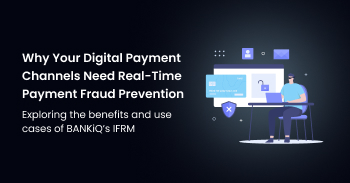Today’s financial landscape perceives uninterrupted transactions moving across borders through various payment platforms. A profound digital transformation in financial institutions has catalyzed remarkable advancements in transaction services. Besides, this evolution has escalated with major financial crimes, including fraud, identity theft, and terrorism financing, that particularly occur in the realm of money laundering.
However, the agile solution that can assist in detecting and preventing illicit transactions to stay safe is Anti-Money laundering (AML). The financial ecosystem strengthens with AML transaction monitoring software to expose and prevent unusual transactions. This software serves as a linchpin for banking institutions and businesses involved in finance to stay compliant with regulations.
Data shows that financial institutions gain a 40% improvement in identifying suspicious activity using AI and ML-integrated AML software. This clearly reflects the efficacy of innovation in combating money laundering and other digital payment frauds.
To study the intricacies of AML transaction monitoring on a deeper level, this blog will serve as a helpful guide for your organization, offering insights on how to enhance real time fraud detection, ensure the company’s compliance efforts, and strengthen protection against financial crime.
What is AML transaction monitoring?
Anti-money laundering transaction monitoring is an effective process that aims to detect, control, and eradicate illegal financial transaction exchange crimes (fraud, bribery, terror financing, and money laundering) by employing real time analysis to safeguard the integrity of banking establishments.
AI-ML integrated with AML helps in fraud detection and prevention systems to read and analyze customer behavior, understand transaction patterns involving large amounts of money, and file suspicious transaction reports (STR) with the respected authority. AML software streamlines the process of compliance and ensures adherence to regulations, including mandatory verification procedures, robust internal controls, and a complaint-free history to access and utilize its solutions.
Which industries require AML transaction monitoring software?
Industries that involve financial activities require money laundering control solutions. Also, firms that deal with transactions, customer accounts, or monetary exchanges can implement AML transaction monitoring software to mitigate financial risk in accordance with regulations.
Domains that require AML solutions include
- Banking
- Financial Services
- Payment Services
- Investment management
- Insurance
- Payment Aggregators
- Payment Gateway Providers
- Fintechs
Benefits of AML transaction monitoring solutions
In the increasingly complex financial landscape, enterprises must safeguard their assets and implement safety measures. AML transaction monitoring is a go-getter solution for global organizations that deal with finance to stay vigilant, scan illicit money proceedings, and secure their business standing.
Let’s take a look at its benefits:
- Retaining reputation: Businesses involved in illegal payments or other related financial activity will damage their reputation, resulting in the ruin of customers’ trust. Integrating anti money laundering software can safeguard against such risks by enhancing reporting, assigning risk scores and verifying customer due diligence to uphold the integrity of organizations.
- Scalability: As the transaction volume increases in banks and other institutions, the AML transaction monitoring system will signify its capability to handle such transactions and efficiently scale to meet operational demands.
- Minimizing fiscal liabilities: Money laundering can bring huge revenue instability to firms, which leads to disrupted operations and regulatory fines. The implementation of real time fraud detection tools can assist in controlling and preventing, through immediate detection and risk mitigation, such wealth and enterprise losses.
- Self-governing operation: AML compliance automation platform tailors its algorithm based on the collection of datasets from businesses and adapts to the unique risk profile, transaction volume, compliance gaps, and regulatory environment to enhance detection of suspicious activities.
- Regulatory conformity: Since cross-channel transactions comprise high payment flows across businesses, global regulatory laws for money laundering may be contradictory and strict. It is highly recommended to implement AML risk management solutions within your organization to avoid severe penalties.
- Strengthening security: AML’s real-time monitoring technology is important for finding holes, weak spots, and new threats (like money laundering and identity theft) in the company’s transaction system and making sure that strong compliance measures are in place.
Features of anti-money laundering software solutions
In order to prevent financial misconduct, companies should leverage advanced transaction monitoring tools with intricate features to identify and assess risks linked to money laundering and other fiscal crimes.
- Real-time transaction monitoring: Integrating payment tracking systems initiates the timely detection of suspicious transaction patterns and alerts related to laundered funds and other transaction violations.
- Name screening: When customers apply for onboarding, Know Your Customer (KYC) will be initiated to avoid security risks, verify transaction histories via merchant screening, and provide an ID for verified customers, promptly alerting anomalous accounts to combat identity theft based on predefined protocols.
- Filing suspicious activity: Monetary sectors with real-time fraud detection system can detect transfer crimes (illegal money), file suspicious transaction reports and manage investigations with the respected authority.
- Predictive risk analysis: Anti money laundering solutions utilize predictive analysis tools and leveraging algorithm techniques to gather and analyze historical transaction data and identify potential risks.
- AI and ML leveraged: Enabling AI and ML in transaction monitoring systems strengthens the precision of crime detection by identifying complex patterns to safeguard the financial landscape effectively.
Challenges in implementing anti money laundering solutions in Organizations
As the circulation of money within organizations increases day by day, it also brings about a rise in economic malpractices such as money laundering and other illicit activities. Consequently, implementing the right solutions becomes challenging in such a business environment.
Let’s indulge in the challenges:
- Traditional approach: Business entities equipped with traditional AML solutions for monitoring their transaction systems end up in huge trouble. Relying on manual processes and outdated technologies results in time-consuming processes, lack of scalability and a hindrance to their workflow progression.
- Regulatory difficulties: Monitoring laws and regulations vary across different regions worldwide, and AML software that does not adapt to this evolution can pose a significant challenge for firms.
- Limited resources: Allocation of resources may be limited in certain businesses for implementation of robust transaction monitoring. So, consulting with leading AML solution providers for cost efficient software may offer a viable solution.
- Poor customer service: Banks and other related institutions with sub-standard AML adherence may result in huge monetary setbacks and a drastic decline in customer loyalty.
Employ an innovative AML transaction monitoring solution with BANKiQ
Are you interested in streamlining your financial security in light of evolving money laundering initiatives? BANKiQ offers intelligent anti money laundering (IAML) solutions for digital payments, providing real time monitoring, advanced cognitive and analytical capabilities, and adhering to pre-defined regulatory compliance rules with the financial intelligence unit FIU – RFI Request for information advisory ensuring safety against illicit financial transactions.
BANKiQ is renowned as one of the superior AML solution providers. It enhances your AML operations with KYC applications, merchant screening, case management, and continuous monitoring. These initiatives allow companies to deploy money laundering control solutions with tailored and controlled security within their premises.
Wrapping up
Financial crime activities have evolved in various ways, and the preventive measures to shield such finances must be transformed as well. Digital payment monitoring systems providing advanced levels of fraud management solutions for banks and other institutions help protect against money laundering and a range of financial transaction crimes.
BANKiQ offers cognitive intelligence and AML risk management solutions on a single platform for all solutions that combat financial frauds for all payment channels, including AEPS (Aadhar enabled payment system) and instant payment platform frauds, and improve overall efficiency.
Step into the future by leveraging transaction monitoring software to safeguard all your operations from money laundering initiatives.
Take control of your financial security with BANKiQ today! Get started!
By BANKiQ





